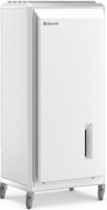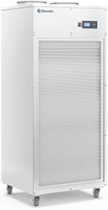Solutions / Problem areas
Powder Ingredients
Challenges
Powder ingredients are a dry substance consisting of very fine particles. The powder form is generally used for transportation or storage before adding liquid to create the finished product within the food and beverage production and other production industries. It is also used in medical production of hazardous drugs. When powder particles are sufficiently small, they easily become airborne and may stay suspended in the air for a very long time. This typically happens when the powder is produced, packaged, or unpackaged to be blended. Powder ingredients can be inhaled, will stick to other surfaces, and are often combustible.

Solutions
With our solutions for air cleaning, you will be able to improve the air quality in your facilities, ensuring a cleaner and healthier environment for both employees and products. Significantly reducing the powder ingredients in the air will lower the risk of employees getting sick and having to take time off from work, or even getting long-term respiratory issues, resulting in increased productivity. Improved air quality air quality also reduces the risk of product contamination, which in turn increases the lifespan and quality of the products, as well as reducing the risk of machines clogging and malfunctioning. In other words, cleaner air means healthier employees, improved product quality, less downtime, and lower cost for maintenance.






